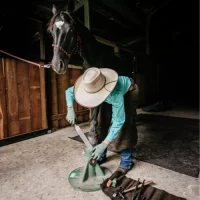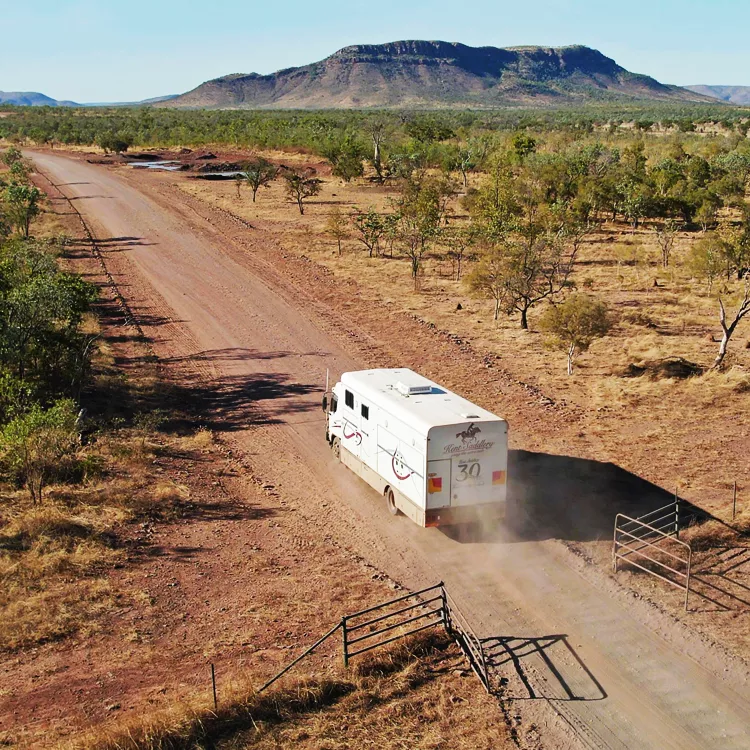Roebuck Plains Stations, Broome, Western Australia
DOUG & SARA MILLER
“Bingara, Boggabri, Bauhinia, Broome.”
For Doug and Sara Miller at Roebuck Plains Station, forty kilometres from Broome, the four “B” towns marked with a dot on the New South Wales, QLD and Western Australia maps represent significant events and passages of time in both their lives.
They came to Roebuck Plains from Comely station near Bauhinia, Sth West of Rockhampton, QLD in a move that required a big shift; physically, mentally, and socially. The Indigenous Lands Corporation purchased Roebuck Plains Station in the late 1990s, and after Doug & Sara’s arrival in 2005, an indigenous training program was begun. Doug has remained as Manager, working closely with the program’s superisors and mentors.
The couple arrived well equipped with experience, qualifications and skills that have proved useful for the successful operation of the station and beneficial for their family. Sara has a part time teaching position in Broome and the Miller boys Archie 10, and Sam, 8 attend school in the town. All good. s supervisors and mentors.
Doug Miller was born and raised in and around the town of Bingara in North West NSW, where his family ran a mixed wheat and cattle farm. Following boarding school education in Sydney, Doug returned home for a couple of years, then spent a year at Consolidated Pastoral company’s Ellerston NSW before working at a Hereford stud near Merriwa in the Hunter valley of NSW. In 1991 he took part in an exchange program; a fourteen month Canadian adventure.
He was assigned to a cattle ranch near the American border in British Columbia, and he describes the location as “in the middle of nowhere.” In what seemed like a step back in time, Doug helped out in a culture in which wood fencing was painstakingly constructed, using timber exclusively cut with chainsaws.
Calving took place in the freezing temperatures of the Canadian Winter and while some bigger holdings brought pregnant cows into barns, the cattle on the smaller ranch where Doug worked were out in the open and cows would drop their calves in the ice and snow. For the young Australian stockman, it was a real eye opener. On a lighter side, Doug, a rugby player from boarding school days, was picked as an obvious contestant in the wild cow milking competition at stampede (rodeo) events. “I was no good at roping,” Doug laughs, “they always put me at the head of the beast.”
Doug then returned to the familiarity of the home farm, on the way visiting his sister in England. At twenty – three years of age, Doug became a “mature age student” and completed a farm management course at the Orange Agricultural College before returning to assist his parents in a new venture, on the South Coast of NSW….. oyster farming.
In 1996 Doug had met Sara at Bingara in a “country school teacher meets local farmer” scenario and they fell in love. Sara, born and bred in Boggabri North West NSW, had come from Sydney where she’d studied and achieved triple qualifications; a Bachelor of Arts, a Diploma in Special Education and a Diploma of Education. She’d become involved in “special needs” care and education in the Campbelltown area and the opportunity to take up a regular teaching position in Bingara proved to be a major turning point in her life. She drove her 1978 Mazda 808 to the town, a vehicle which Doug claims “shouldn’t have been allowed on the roads in Australia….. you had to start turning the steering wheel about an hour before a corner.” Sara saw her car as a safeguard….. “If the car was an indicator of my financial status, anyone I met sure wouldn’t have been interested in me for my money.”
Sara claims she can’t remember Doug’s assertion that in spite of fierce competition from many of the local blokes, (Sara’s would be suitors) “he got the prize!” Engaged in 1997 and married in 1998, the couple then committed to three years of involvement with the oyster farm and a charter boat operation.
During this time Sara remained “horse mad and right into dressage. I loved it!” She looks meaningfully to Doug. “You loved it too didn’t you darling?” Doug’s response is indicative of his interest in dressage. “It’s not exactly a spectator sport.” Undeterred, Sara continues, “On the South Coast I DID buy my beautiful dressage horse “Shorty.” He was 17.1 hands high and we had to buy an extended horse flaot for him.” Once more there’s a meaningful glance in Doug’s direction. “This is how patient Doug is” his wife explains. “We then had to get a 4 Wheel Drive to tow the extended horse float around….. Doug just went with it.” Doug responds, “Love is blind!”
After the three years they’d had enough. It seemed the call back to the bush was having an impact and Doug was successful in an application to the Colonial Agricultural Co for the Manager’s position at Comely Station 140 kilometres South West of Moura QLD. It was during the “five good years” they lived there that their two sons Archie and Sam were born and Doug commends the benefits of the station’s operation. “Comely is a fattening and finishing property, one of the best in Australia.” For the first year at Comely, Sara was the station cook and she and Doug laugh about the first killer that Doug brought to the kitchen….. a huge Santa bullock….. We had to cook the T Bones one at a time in the frying pan….. took about forty – five minutes to cook a steak!”
With characteristic energy and enthusiasm, Sara assisted with the administration and bookkeeping at Comely and she also discovered that there was a school sixty – nine kilometres down the road. She soon obtained some teaching time there and is reassured that a teaching qualification is “a great thing….. you usually get work wherever you go.” The couple appreciated their time at Comely. “Living in the Bauhinia community; it was very social, tennis, water skiing, campdrafting, a community store. We loved it there.” Coming to Roebuck Plains Station was a very different experience. It is uniquely placed and Doug and Sara describe it as “a great cattle station.” Encompassing a couple of hundred thousand acres of marine plain country, it’s ideal for growing out and fattening cattle. The country is not affected by floods, so the cattle can be reached easily and moved out earlier. Usually, eight to nine thousand head are sold annually, and as well as keeping eleven thousand breeders, Roebuck Plains takes the dry cattle from Myroodah, another ILC station near to Derby, WA. Roebuck Plains also operates an export depot, so there are always ample employment opportunities for participants in the training program. It’s very rewarding for Doug and Sara when trainees commit to the training and become full time employees either at the station, the export depot, or within other industries eg mining. The Millers and training supervisors recognize that the proximity of Roebuck Plains to Broome is a disadvantage, as young trainees are easily distracted and sometimes discontinue with the program. It’s constantly a work in progress.
In 2005, when Doug Miller saw that the Manager’s job at Roebuck Plains, West Australia had become available, he turned to his wife Sara and suggested enthusiastically, “That would be a good job!” Sara responded emphatically, “As if I am moving to Broome!” And she did! They brought with them energy, enthusiasm and dedication. The towns of Bingara, Boggabri, Bauhinia and Broome have represented places in which Doug and Sara, and their boys have confirmed their ability, in whatever the situation, to adjust and thrive.















